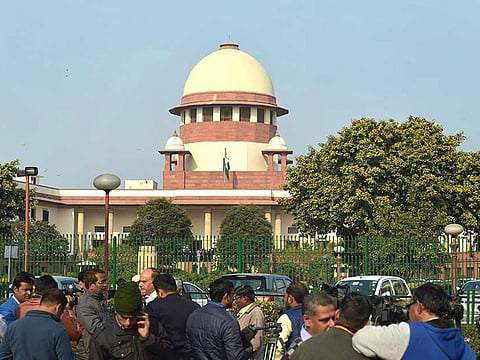Differing views from the legal fraternity
Fewer courts, governmental apathy towards judiciary lead to backlog

New Delhi: The Indian Law Commission has studied the problem of delay in Indian judicial system extensively over the years. But, with over 21 million cases pending, there seems no solution to it. Gulf News spoke to some prominent lawyers to know why it takes courts several years to deliver the verdict on cases.
Harvinder Singh Phoolka, senior High Court lawyer, has been fighting for victims of the 1984 Sikh massacre that took place after Prime Minister Indira Gandhi’s assassination on October 31. The more than three decades struggle for justice has not lessened his zeal in any way.
Blaming the infrastructural deficiencies, he said, “If the guilty of 1984 had been punished (in time), Gujarat would not have happened. If today you forget the Sikh riots, tomorrow you have to be prepared for something bigger.”
Supreme Court lawyer Prashant Bhushan put the onus on, “less number of courts and shortage of competent judges.” He asserted, “often in influential cases, lawyers seek adjournments, thus prolonging trials, which result in the courts taking several years to deliver verdict on cases.”
Colin Gonsalves, founder director of Human Rights Law Network, one of country’s leading public interest law groups, was extremely forthright. “The reason why cases take too long in India is because the government is refusing to appoint more judges. And that is because the government is hostile towards the judiciary. They don’t want an effective judiciary and the rule of law. And all this is done deliberately because the judges are catching the government all the time for not doing its duty.”
Gonsalves was recently conferred upon with the Right Livelihood Award (also referred to as the Alternative Nobel) for “his tireless and innovative use of public interest litigation over three decades to secure fundamental human rights for India’s most marginalised and vulnerable citizens.”
While veteran lawyers blamed the government for not creating better infrastructure, lawyer Karan Kalia, who has worked with senior advocate Ram Jethmalani, emphasised on the contribution of the courts to the problem by non-adherence to procedural time frames.
Attributing the delay to lack of attention to research system, Kalia ruled, “We take into account the 670 odd Supreme Court and High Court judges, but we don’t consider the over 17,500 trial court judges, who take maximum time to decide on a case, which then goes to the high court and finally to the Supreme Court. The answer lies in reducing the number of cases in the trial court by disposing off the matters quickly.
“The irony is that while a SC judge gets 3-4 legal law clerks to research for him, a high court judge has 1-2 researchers. Whereas, a trial court judge, handling innumerable cases, has no researcher to assist him. So, how does one expect a judge who’s not well equipped, to finish off the cases expeditiously?
Having witnessed long and stressful delays in the legal system, the young lawyer has come up with the world’s first segregation system LegitQuest, an Indian legal research portal that transforms complex and unstructured legal data for the benefit of the legal fraternity. It aims to reduce the total time spent on finding as well as analysing the case judgements by the end user.
Massive backlog
What could speed up the judiciary:
Sign up for the Daily Briefing
Get the latest news and updates straight to your inbox



